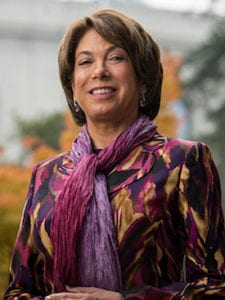
Prof. Laura Tyson will study how U.S. businesses and policy makers can better respond to the coming labor market disruptions caused by artificial intelligence and automation—and what we can learn from the German system—as a Berlin Prize Fellow this fall.
Tyson, a distinguished professor of the graduate school, former dean of the Haas School, and faculty director of the Institute for Business and Social Impact (IBSI), will spend the fall semester at the American Academy in Berlin. She is one of 20 scholars, writers, and artists to be awarded the prestigious semester-long Berlin Prize for the 2019-20 academic year.
As a Berlin Fellow, Tyson will continue her research on how AI and automation are affecting the future of work. Like other technological advances, AI and automation will fuel displacement of labor and change the nature of work, but they will also contribute to gains in productivity, income growth, and the demand for skilled human labor, she says. This transition will be costly, however, and is likely to fuel growing income inequality. New policies, training, and innovation will be needed to address these challenges, she says.
Tyson see Germany as particularly well-positioned to handle the economic trials ahead, and plans to investigate the German system of training and apprenticeships, various sectors of German industry, and unique features of German business governance such as works councils, employers’ associations, and supervisory boards. The German case shows that the future is not technologically predetermined and can be shaped by thoughtful policies and actions by business leaders, policymakers, workers and citizens, she says.
“Ultimately, these effects depend not on the design of smart machines and technologies, but on the design of smart practices and policies appropriate for a new machine age,” Tyson said in a press release.